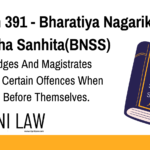Code: Section 399 BNSS
Compensation for Wrongful Arrest
(1) Whenever any person causes a police officer to arrest another person, if it
appears to the Magistrate by whom the case is heard that there was no sufficient ground for
causing such arrest, the Magistrate may award such compensation, not exceeding one
thousand rupees, to be paid by the person so causing the arrest to the person so arrested,
for his loss of time and expenses in the matter, as the Magistrate thinks fit.
(2) In such cases, if more persons than one are arrested, the Magistrate may, in like
manner, award to each of them such compensation, not exceeding one thousand rupees, as
such Magistrate thinks fit.
(3) All compensation awarded under this section may be recovered as if it were a fine,
and, if it cannot be so recovered, the person by whom it is payable shall be sentenced to
simple imprisonment for such term not exceeding thirty days as the Magistrate directs,
unless such sum is sooner paid.
Explanation:
Section 399 of the Bharatiya Nagarik Suraksha Sanhita (BNSS) provides a provision to compensate individuals who have been groundlessly arrested by law enforcement officers. This provision ensures that a person who wrongfully causes another to be arrested without sufficient grounds will be held accountable, and the person who has been unjustly arrested will be compensated for the time, inconvenience, and expenses incurred as a result.
In instances where an arrest is deemed to be unwarranted, the Magistrate overseeing the case has the discretion to award compensation up to one thousand rupees to the wrongfully arrested individual. This amount compensates the arrested person for the time lost and expenses incurred due to the arrest.
The law also allows for situations where multiple persons are wrongfully arrested. In such cases, each individual may receive compensation, not exceeding the same amount. Furthermore, the law provides a means to recover the compensation from the person who caused the arrest, similar to recovering a fine. If the compensation is not paid, the person liable for it may face simple imprisonment for up to 30 days.
Illustrations:
Example 1: Compensation for Unjust Arrest
If Person A causes the arrest of Person B by providing false or insufficient information to the police, and the Magistrate finds that there was no justifiable reason for the arrest, Person B may be awarded compensation of up to one thousand rupees for the inconvenience and financial loss caused by the wrongful arrest.
Example 2: Multiple Groundless Arrests
If Person A, Person B, and Person C are all arrested based on a false accusation without sufficient grounds, the Magistrate may award compensation to each of them, not exceeding one thousand rupees per individual, for the loss and expenses incurred during the wrongful arrest.
Common Questions and Answers (Q&A):
Q1: Who is liable to pay compensation in case of a groundless arrest?
A1: The person who causes the arrest without sufficient grounds will be held responsible for paying compensation to the wrongfully arrested individual.
Q2: How much compensation can be awarded under Section 399?
A2: The Magistrate can award compensation of up to one thousand rupees to the person who was wrongfully arrested. This compensation covers the loss of time and expenses incurred due to the arrest.
Q3: Can multiple individuals be compensated if they are arrested groundlessly?
A3: Yes, if more than one person is wrongfully arrested, each individual can be awarded compensation, not exceeding one thousand rupees per person, depending on the circumstances.
Q4: What happens if the person liable to pay compensation fails to do so?
A4: If the compensation cannot be recovered as a fine, the person who is supposed to pay the compensation may be sentenced to simple imprisonment for up to 30 days, unless the amount is paid sooner.
Q5: Can the amount of compensation exceed one thousand rupees?
A5: No, the compensation awarded under Section 399 is limited to one thousand rupees per individual, as determined by the Magistrate.
Conclusion:
Section 399 of the Bharatiya Nagarik Suraksha Sanhita (BNSS) ensures that individuals who have been wrongfully arrested due to insufficient or false grounds are compensated for the loss of time and expenses they incur as a result. By holding the person who caused the wrongful arrest financially responsible, this section seeks to deter the misuse of police powers and protect the rights of individuals against unjust arrest.
In addition to financial compensation, the law provides a mechanism to enforce the payment of the awarded compensation, including the potential for simple imprisonment if the compensation is not paid. This serves as an effective deterrent against the abuse of authority and emphasizes the importance of accountability in law enforcement actions.
Section 399 ensures that justice is not only done but is also seen to be done by protecting individuals from unjust arrests and holding those responsible for such actions accountable.
For legal assistance or to know your rights under BNSS, visit ApniLaw for expert legal guidance. 🚀








